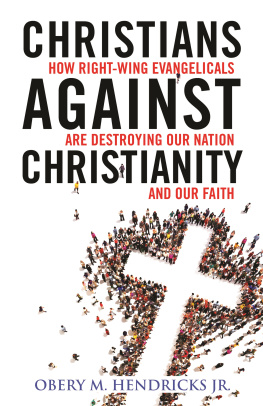A FIELD GUIDE TO
EVANGELICALS
&
Their Habitat
JOEL KILPATRICK

CONTENTS

E vangelical Christians in America now number 70 million people, and they are populating at an estimated rate of 3.2 children per family. They kicked electoral tail in the 2004 elections. And alarmingly oversized mega-churches are sprouting up in suburbs from coast to coastperhaps even near your favorite bar. For non-evangelicals, and for any civic-minded American, there has never been a greater need to understand this unique subculture. In fact, in our pluralistic society we must learn, in the words of a great American, to all get along so our cities dont devolve into something resembling Jerusalem, Darfur, or South Central L.A. We must put aside petty annoyances with each others cultural habits and learn to tolerate, even enjoy, interacting with people of other religious faithsno matter how abrasive we find them at first.
After all, evangelicals will not disappear from the American scene anytime soonbarring the Rapture. But well get to that later.
We at LarkNews have made it our mission to encourage cross-cultural understanding between evangelicals and other faith groups (see www.larknews.com). Now, for the first time, we have pooled our expertise and are offering this definitive guide to evangelicals and their way of life. Whether you come at the subject intrigued, confused, or even irritated, this first-of-its-kind field guide will help you discover evangelicals for yourself. In the forthcoming pages we will answer common questions, such as:
Do evangelicals really think everybody except them is going to hell?
Why are family values such a big deal to them?
How do evangelicals have fun"?
At what point did they gain express control of the Republican Party?
Where do evangelicals reside, and why do they decorate their homes the way they do?
In a pinch, how do I talk like an evangelical?
This book is also for readers who may have more pressing concerns. Perhaps you are tired of your evangelical neighbors weekly invitations to church and wish to know how to dampen his or her enthusiasm about your eternal soul.
Or maybe your niece just became engaged to an evangelical who will be coming to your house for Hanukkah. In these cases, and many more, you have picked up the right book!
Before we begin, let us offer a special note to those readers who have unusually high hostility levels toward evangelicals. Perhaps you were raised in a home where they were called religious zealots, right-wing fanatics, narrow-minded bigots, homeschooling Jesus freaks, or Bible thumpers. It would be useful to assess your exact EHQEvangelical Hostility Quotientso this book can offer specific help. Start by taking this brief test:
When you see someone toting a Bible in public, you:
- Think to yourself, I wish that person would share his or her personal faith with me.
- Feel grateful that our country ensures freedom of religion.
- Express loud annoyance at this intrusive public display of faith.
- Beat the person with available objects.
The next time you see someone reading Left Behind on an airplane, you probably will:
- Ask to sit next to him or her and talk about spiritual things.
- Politely pretend to sleep.
- Request a different flight.
- Find a way to dump the drink tray on him or her.
A co-worker invites you to church. You:
- Accept.
- Decline and begin prominently displaying your menorah, healing crystals, or Buddhist mandala.
- Complain to a supervisor.
- Create a special cup of coffee and copier toner for the co-worker.
Add up your responses, awarding one, two, three, or four points according to the number of each answer. Now compare results:
1-5LOW EHO: You are highly tolerant of evangelicals. 6-9ELEVATED EHO: You occasionally feel threatened or irritated by evangelicals. 10-12DANGEROUSLY HIGH EHO: Do not attempt to interact with an evangelical before reading this book!
No matter what your EHQ is, by the time you finish this guide you will be an expert in identifying and communicating with people who once frightened or puzzled you. We hope that within these pages you discover hours of pleasure in exploring this fascinatingand unavoidableAmerican way of life.
Happy sighting!

E vangelicals believe in many things: the Father, Son, and Holy Spirit, church attendance, homeschooling, Fox News, abstinence, personal holiness, toupees, leisure suits, mission work, Dockers, golf, spanking, and dinner, early and often. But the natural starting point for identifying evangelicals by their beliefs is with their best-known doctrine: hell.
IN A HANDBASKET
Evangelicals believe certain people are going to hellyou, for example, unless you already happen to be an evangelical. But behind the hellfire and brimstone talk are core beliefs that have deep meaning for evangelicals. Here are the three most important ones:
CORE BELIEF #1Every person has an obligation to accept Jesus as his or her personal savior. The phrase personal savior is important, as it separates evangelicals from Catholic and Orthodox Christians who simply run their offspring through the gamut of religious rituals and call it square. To receive Christ personally means you have an epiphany about your personal sinfulness and Jesuss unique ability to rescue you from it. This is called being saved. If you have not had this experience, you are considered unsaved.
CORE BELIEF #2Jesus is coming back soon, probably tomorrow.
CORE BELIEF #3If you have neglected Core Belief #1, and Jesus does indeed come back tomorrow, you are going to hell.
You may read as much evangelical theology as you like, but the essence is contained in these three beliefs. Clearly, these convictions give the evangelical worldview an amazing urgency. Through their lenses, every non-evangelical around them is dancing blindly on a plank overhanging the lake of fire. Evangelicals respond to this urgency with several reasonable behaviors:
They buy television airtime so televangelists can parade the latest in evangelical fashions and hairstyles before receptive American audiences. They hit the streets and hand out frightening cartoon pamphlets, hoping these will lead people into lifelong, loving relationships with Jesus. They confront people at work, in school hallways, and in plain view at other public sites about their relationship with Christ. They perform spiritual dramas to music, often in public squares, at school talent shows, and in other places where ridicule is guaranteed.
Each of these behaviors is designed, in its own fashion, to rescue people from hell. Perhaps this fixation with hell bothers you (readers with high EHQs take note). But from a sociological point of view, believing in hell is thought to be less violence-inducing than believing in heaven. Members of some religions go on suicide runs, thinking they will earn a vaunted position in heaven, including dozens of extra virgins. In contrast, evangelicals dont want anyone to die until they have received Jesus. There is no reward in evangelical theology for killing other people, and there hasnt been since about 1270 A.D. (The reward for enslaving people also ran out, in about 1865, and in some southern states in 1972.) For readers with an EHQ above 10, this may be the first attractive thing they have ever learned about evangelicals.











